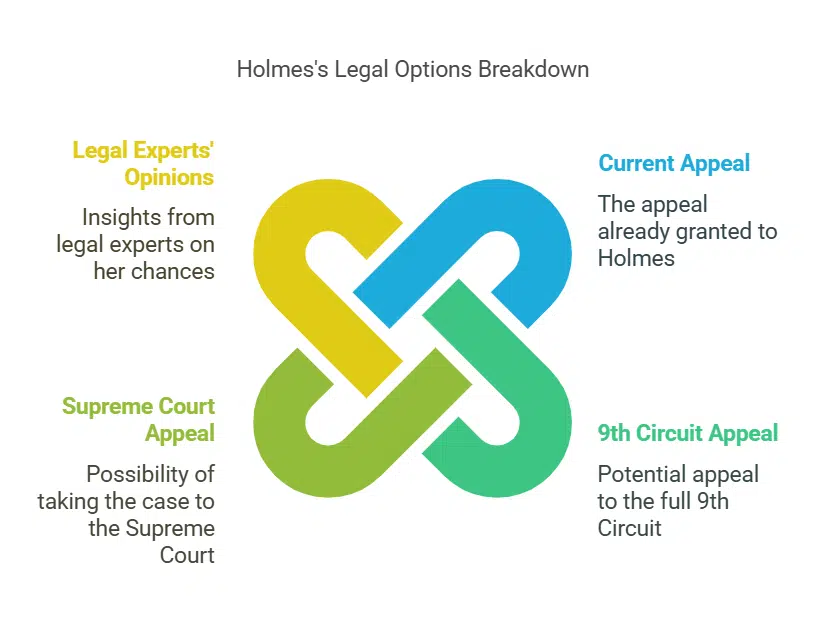A U.S. federal appeals court has denied Elizabeth Holmes’s appeal to overturn her 2022 conviction for fraud, reinforcing the legal consequences of one of the most infamous corporate scandals in recent history. Holmes, the former CEO of Theranos, was convicted of multiple counts of wire fraud and conspiracy related to misleading investors and patients about her company’s blood-testing technology. The latest ruling is a significant blow to Holmes, who is currently serving an 11-year sentence at a federal prison in Texas.
Court’s Decision and Legal Arguments
On Monday, February 24, 2025, a three-judge panel from the 9th U.S. Circuit Court of Appeals in San Francisco upheld Holmes’s conviction and sentence. The ruling reaffirmed the lower court’s decision, dismissing Holmes’s claims that her trial was unfair due to legal errors.
Holmes argued that the trial judge improperly allowed former Theranos employees to testify as expert witnesses. However, the appeals court ruled that these individuals spoke from their own experiences and were not formally acting as expert witnesses. While the judges acknowledged that some parts of the testimonies might have strayed into expert territory, they ultimately deemed any such errors “harmless” and not influential enough to change the outcome of the trial.
Another key argument in Holmes’s appeal was the use of a 2016 report from the Centers for Medicare and Medicaid Services (CMS), which detailed serious deficiencies in Theranos’s lab operations. Holmes claimed the CMS report misled the jury, but the appeals court rejected this argument. The judges found that the report was relevant and legally admissible because it highlighted the unreliability of Theranos’s technology, a central issue in the trial.
Additionally, Holmes contended that she was unfairly restricted from cross-examining a former Theranos laboratory director, which she argued violated her rights. The appeals court ruled that limiting this access was justified and did not compromise the fairness of her trial.
Impact of the Ruling on Holmes’s Legal Future
Legal experts suggest that this latest decision significantly diminishes Holmes’s chances of overturning her conviction. According to Neama Rahmani, a former federal prosecutor, this may mark “the end of the road” for Holmes’s legal battle.
“She gets one appeal as of right, and this was it,” Rahmani told People Magazine. While Holmes could still attempt to appeal to the full 9th Circuit or take her case to the U.S. Supreme Court, legal analysts say the likelihood of success is extremely low. The Supreme Court only hears a tiny fraction of cases presented to it, and Holmes’s case does not appear to meet the criteria for review.
Background: The Rise and Fall of Theranos
Elizabeth Holmes founded Theranos in 2003, when she was just 19 years old. The company promised to revolutionize healthcare with proprietary technology that could run dozens of blood tests using just a few drops of blood. At its peak, Theranos was valued at $9 billion, and Holmes was hailed as a visionary, drawing comparisons to Steve Jobs. She attracted high-profile investors, including media mogul Rupert Murdoch, former U.S. Secretaries of State Henry Kissinger and George Shultz, and major venture capital firms.
However, investigations by The Wall Street Journal in 2015 revealed that Theranos’s technology was deeply flawed and unreliable. The company’s devices failed to produce accurate results, and many tests were secretly run on traditional machines from competitors. Following these revelations, Theranos collapsed, and Holmes, along with former company president Ramesh “Sunny” Balwani, faced criminal charges for defrauding investors and patients.
In 2022, Holmes was found guilty of three counts of wire fraud and one count of conspiracy to commit wire fraud. She was sentenced to 11 years and three months in federal prison. Balwani, her former romantic partner and top executive at Theranos, was convicted on similar charges and received a 13-year prison sentence. His appeal was also denied alongside Holmes’s.
Holmes’s Life in Prison and Sentence Reduction
Holmes began serving her sentence in May 2023 at Federal Prison Camp Bryan, a minimum-security facility in Texas. Originally sentenced to over 11 years, her time behind bars has been slightly reduced due to good behavior. Her projected release date is now August 16, 2032.
Despite the highly publicized downfall of her career, Holmes has reportedly been adjusting to life in prison. She has participated in prison programs and has been involved in efforts to help fellow inmates. In a rare interview, Holmes described her incarceration as “a time for reflection,” though she still maintains her innocence and insists that her intentions were always to advance medical technology, not to commit fraud.
What’s Next for Holmes?
With her appeal rejected, Holmes now has very few legal avenues left. Her options include filing a petition for rehearing with the 9th Circuit, requesting the full appellate court to reconsider her case, or attempting to take her case to the U.S. Supreme Court. However, given the nature of her conviction and the court’s ruling, legal experts say these options are unlikely to succeed.
Holmes’s downfall has been a cautionary tale in Silicon Valley, highlighting the dangers of overpromising technology that does not yet exist. The Theranos scandal also led to increased scrutiny of healthcare startups and reinforced the need for regulatory oversight in the biotech industry.
For now, Elizabeth Holmes remains behind bars serving a sentence that, despite appeals, appears to be firmly in place. While her story once captivated the world as a tale of ambition and innovation, it has now become one of deception and consequences.





































